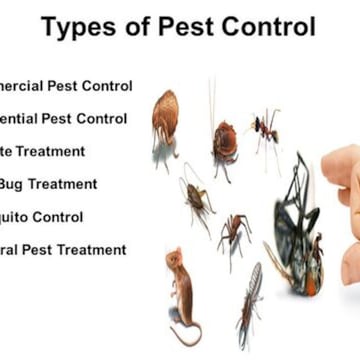Some Known Questions About Pest Control.
Some Known Questions About Pest Control.
Blog Article
The Only Guide to Pest Control
Table of ContentsThe Definitive Guide to Pest ControlThe Ultimate Guide To Pest ControlNot known Incorrect Statements About Pest Control Little Known Facts About Pest Control.8 Simple Techniques For Pest Control
Limitations of Chemical Monitoring Be able to evaluate insect troubles, establish if monitoring is necessary, and make suitable recommendations using IPM strategies. Be acquainted with different techniques of pest monitoring - their benefits and limitations.This chapter discusses (IPM), an approach that makes use of understanding about parasites and their, methods, nonchemical methods, and chemicals to manage parasite problems. Extra info regarding IPM for specific plants is consisted of in phases that focus on those plants. Nonchemical parasite control measures are emphasized in chapter 17, "Organic Gardening." Handling birds and creatures is covered in phase 20, "Wildlife." Handling in the lawn and garden is covered in chapter 6, "Weeds." Pests in a garden or landscape may include pests and mites, weeds,, mammals, and birds.
Bugs and weeds, nonetheless, play a role in the. After planting a yard or developing a grass, the all-natural procedure of plant sequence starts to reestablish and nonnative plants.
What we call "insects" are component of an all-natural system at work. Only people consider particular species parasites when they take place where they are not wanted.
Excitement About Pest Control
Bugs at risk to a chemical were swiftly killed, leaving resistant ones to breed and multiply. It came to be clear that pesticides alone would not fix all insect problems.
An IPM strategy permits some level of bugs in the environment. Insects are a lot less most likely to survive a program that uses several methods of reducing their populaces. Integrated parasite administration was very first recommended by entomologists since insects were the initial team of bugs to confirm challenging to manage with chemicals alone.
A limit is the factor at which action must be taken. IPM has actually extended past bugs to monitoring of all pest populations: weeds, condition organisms, and mammals.
Pest Control Things To Know Before You Get This
Management rather than removal of pests is the goal. An IPM plan starts with a cautious evaluation of each parasite infestation. Just then can one choose concerning the suitable strategies needed to subdue bug activities. The life process of the bug, feasible damages, all-natural enemies, and effects of weather condition, to name a few elements, are taken into consideration before a control strategy is carried out - Pest Control.
Clover growing in a grass might be deemed an undesirable weed, but as a legume it is synthesizing nitrogen for the soil and the flowers are offering nectar to honey and various other. Tolerance for some weeds might belong to an IPM plan. may be consuming the leaves of a plant, yet when they are identified as the larvae of Eastern tiger swallowtail butterflies, their damages might be tolerated so we can appreciate the beautiful butterfly.

The second essential tool in parasite monitoring is very early intervention. Being present and observant in the garden ensures early detection. Responding to troubles quickly, before they have time to multiply, calls for a less dramatic treatment. The 3rd essential tool is recordkeeping; tracking what takes place in the garden enables a garden enthusiast to recognize patterns and make informed choices.
The Main Principles Of Pest Control
Numerous secure, useful, nonchemical approaches of plant defense and insect monitoring might lower or remove the demand to spray. Various other techniques are most valuable when utilized with pesticides. To implement management techniques appropriately and to decrease losses, garden enthusiasts need to understand the kinds of pests that attack plants and comprehend pest biology.

Carrying out a dirt examination and using only the suggested amount of fertilizer and lime makes the most of the benefit to the plant while minimizing troubles connected to excessive use of fertilizer - Pest Control. Treatment the dirt with a number of inches of compost shields the plant in several methods: lowering soil water loss to dissipation, minimizing weed competition, offering nutrients, and creating an appropriate setting for earthworms and bacteria that maintain the dirt loose for origins and break down natural product to launch nutrients
If mulch touches the trunk, it can create a means for voles, germs, and fungi to strike the plant. Do not utilize manure or compost visit their website that has actually not thoroughly decayed as a top dressing since it can motivate undesirable parasites. Research study suggests that tilling the soil is harmful to soil structure.
Some Ideas on Pest Control You Should Know
If tilling is considered required, think about doing it in the fall when the life cycles of several parasites brings them near the surface area. At the surface area, insects end up being revealed to the climate as well as birds and other all-natural adversaries.
Report this page